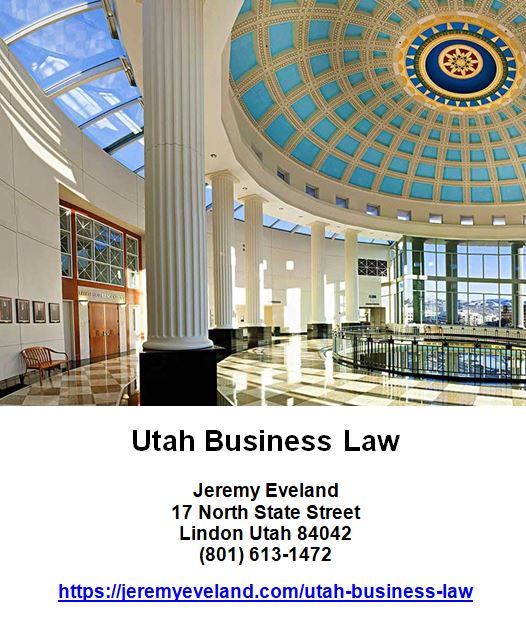Business Lawyer
A business lawyer is an attorney that specializes in the legal aspects of business operations and transactions. They are an invaluable resource for businesses in Utah as they are knowledgeable about the laws that apply to business and can help protect businesses from potential legal issues. A successful business lawyer will be able to provide sound legal advice and representation to business owners in Utah. They can also provide strategic advice to help businesses achieve their goals in a legal manner.
Businesses in Utah must abide by the laws that are in place by the state and federal government. The laws that apply to business operations and transactions must be followed, or penalties may be imposed. Because of this, it is essential that businesses in Utah are aware of the legal issues they may face and the legal resources they can utilize. This essay will discuss the importance of a business lawyer and the various legal issues businesses in Utah may face.
Business Law
Business law encompasses a wide range of legal topics, such as corporate law, contract law, tax law, employment law, intellectual property law, and more. A business lawyer should be knowledgeable about all these laws and be able to provide informed advice to their clients. In order to become a business lawyer, one must obtain a Juris Doctor (JD) degree from a law school and pass the bar exam. The bar exam is an exam that tests a lawyer’s knowledge of the laws that apply to business operations in the state of Utah.
How Businesses Can Avoid Lawsuits
Lawsuits can be incredibly costly for businesses and can threaten the livelihood of their owners. To protect their investments, businesses must take the necessary steps to ensure they are not at risk of being sued. In the state of Utah, businesses must ensure they are familiar with the relevant laws and regulations that govern their industry, as well as the legal precedents that have been established by the state’s court system. By understanding the legal issues that may be relevant to their business, companies can take the necessary steps to avoid costly lawsuits.
The first step businesses in Utah must take in order to avoid lawsuits is to become familiar with the relevant laws and regulations that govern their industry. Utah is governed by a wide range of laws, both at the state and federal level. Businesses must ensure they are familiar with the applicable laws, regulations and codes of conduct that pertain to their operations. This includes laws related to employment, taxation, health and safety, and environmental protection, among others. Failure to comply with applicable laws and regulations can result in legal action being taken against the business.
In addition to understanding applicable laws and regulations, businesses in Utah must also be aware of the legal precedents that have been established by the state’s court system. Utah’s court system provides an invaluable resource for businesses to use in order to understand the legal principles that are applicable to their operations. The court system has established a number of legal precedents in areas such as contract law, tort law, and property law, among others. By understanding the legal precedents set by the court, businesses can make sure they are not in violation of any laws or regulations that may be relevant to their operations.
Businesses in Utah must also take the necessary steps to ensure their contracts are legally binding. Contracts are an essential part of any business, as they help to protect the company’s interests in the event of a dispute. Contracts should be drafted with the assistance of an experienced attorney in order to ensure they are legally valid and enforceable. It is important to remember that contracts are legally binding documents, and any breach of contract can result in legal action being taken against the business.
Finally, businesses in Utah must ensure they are compliant with various consumer protection laws. Utah has a number of consumer protection laws in place in order to protect consumers from unfair or deceptive business practices. These laws include the Utah Consumer Sales Practices Act, the Utah Consumer Fraud Act, and the Utah Unfair Trade Practices Act, among others. Businesses must ensure they are compliant with these laws in order to avoid costly lawsuits.
By taking the necessary steps to become familiar with applicable laws and regulations, understanding the legal precedents established by the court system, making sure their contracts are legally binding, and remaining compliant with consumer protection laws, businesses in Utah can take the necessary steps to avoid costly lawsuits. While it is impossible to guarantee that a business will never be sued, taking these steps can help to significantly reduce the risk of a lawsuit and protect the business’s interests.
Legal issues that businesses in Utah may face can vary greatly. For example, businesses may have to deal with contract disputes, intellectual property infringement, employment discrimination, and more. It is important that businesses are aware of the potential legal issues they may face and have access to legal resources that can help them. This is where a business lawyer can be instrumental. A business lawyer can provide sound legal advice and representation to help businesses navigate the legal landscape.
Legal Advice For Businesses
In addition to providing legal advice, a business lawyer can also help businesses with legal documents. Legal documents such as contracts, leases, and other documents must be drafted in accordance with the laws of the state of Utah. A business lawyer can ensure that all legal documents are written in accordance with the laws of the state and can advise businesses on how to best protect their interests in any legal document.
Business lawyers can also be instrumental in helping businesses protect their interests in court. A business lawyer can provide representation in court proceedings and can help businesses achieve their desired outcomes. Many business lawyers have a record of successful verdicts in court and can help businesses protect their interests in any legal proceeding.
Business lawyers can also be helpful in dealing with insurance coverage cases. Insurance companies can often deny coverage for business-related claims and a business lawyer can help businesses get the coverage they are entitled to. For example, the California Automobile Association recently won a case against Progressive Casualty Insurance in which the court ruled in favor of the California Automobile Association. A business lawyer can provide strategic advice to businesses in similar cases and help them protect their interests.
Utah Business Lawyers Can Help Businesses Stay Compliant
Business lawyers can also be helpful in dealing with global risks. Businesses in Utah may face legal issues in other countries and a business lawyer can provide strategic advice on how to best protect their interests in these cases. For example, the America Corporation recently won a case against Mutual Insurance Company in which the court ruled in favor of the America Corporation. A business lawyer can provide legal advice to businesses in similar cases and help them protect their interests.
Business lawyers can also be helpful in dealing with personal clients. A business lawyer can provide sound legal advice and representation to clients who are dealing with legal issues. For example, a business lawyer recently represented a client in a case involving a dispute over a contract and was able to successfully negotiate a favorable settlement for their client.
Finally, business lawyers can also be helpful in helping businesses draft legal documents. Business lawyers can provide sound legal advice on how to draft legal documents that are in accordance with the laws of the state of Utah. They can also help businesses draft contracts and other legal documents that protect their interests.
In essence, business lawyers are an invaluable resource for businesses in Utah. They can provide sound legal advice and representation in a variety of legal matters, from insurance coverage cases to contract disputes. Business lawyers can also help businesses draft legal documents and provide strategic advice on how to best protect their interests in any legal situation. For businesses in Utah, a business lawyer can be the difference between success and failure.
Business Lawyer Consultation
When you need legal help from a business attorney, call Jeremy D. Eveland, MBA, JD (801) 613-1472.
Jeremy Eveland
17 North State Street
Lindon UT 84042
(801) 613-1472
Areas We Serve
We serve businesses and business owners for succession planning in the following locations:
Business Succession Lawyer Salt Lake City Utah
Business Succession Lawyer West Jordan Utah
Business Succession Lawyer St. George Utah
Business Succession Lawyer West Valley City Utah
Business Succession Lawyer Provo Utah
Business Succession Lawyer Sandy Utah
Business Succession Lawyer Orem Utah




















